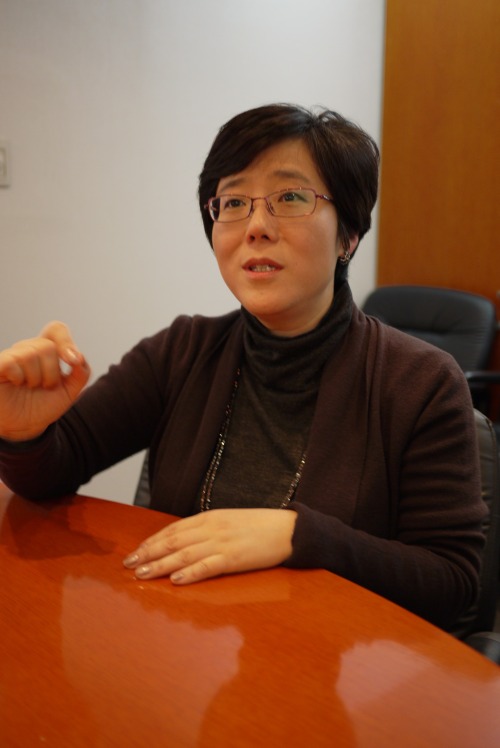Shin Eun-hee has a unique duty in her role as a top executive.
She not only supervises Korean operations of the Nielsen Company, a global information and media firm, but also Japanese operations, assuming the role of managing director for the two crucial markets in East Asia simultaneously.
What’s more unusual is that Shin does most of her business here in Seoul. The convention is that regional CEOs in the Asia-Pacific region devote more time and energy to Japan, whose market size is generally bigger than Korea’s in most sectors. For Nielsen, the opposite is true: Its Korean operations have a staff of 300 while its Japanese unit is composed of just 100.
The disparity illustrates the dominant presence of Japanese marketing research firms that effectively outsmart multinationals, including Nielsen, Shin said.
She not only supervises Korean operations of the Nielsen Company, a global information and media firm, but also Japanese operations, assuming the role of managing director for the two crucial markets in East Asia simultaneously.
What’s more unusual is that Shin does most of her business here in Seoul. The convention is that regional CEOs in the Asia-Pacific region devote more time and energy to Japan, whose market size is generally bigger than Korea’s in most sectors. For Nielsen, the opposite is true: Its Korean operations have a staff of 300 while its Japanese unit is composed of just 100.
The disparity illustrates the dominant presence of Japanese marketing research firms that effectively outsmart multinationals, including Nielsen, Shin said.

The differences between the two markets, Shin said, at once befuddle and fascinate multinational CEOs interested in the East Asian market.
“Korea and Japan share the same marketing research methodology, but the way they execute it is different,” Shin told The Korea Herald. “Korea focuses on speed while Japan is concerned about accuracy, and Korea makes quick decisions to catch up with the changing markets while Japan sticks to a single model for a relatively longer period of time.”
The most striking characteristic of Korea’s market survey practices is the preference for ad-hoc research projects, Shin said. “Regular surveys that track a certain segment are widely used in advanced countries, but Korean companies are not interested in this type of tracking research. Instead, they conduct surveys whenever necessary, a style that quickly reflects the trend,” she said.
Korean clients’ preference for ad-hoc research also goes hand in hand with the prevalence of customized methodologies. Shin said these customized methods are largely intended for a specific marketer’s needs, such as which part in a new product should be fixed.
In contrast, Japanese clients spend a fair amount of time selecting an optimal methodology, and once it’s decided, they stick to the same technique. “My impression is that Japanese companies seem to feel a sense of security when they use the same, proven survey methodology,” Shin said.
Participants in surveys also show differences. Japanese respondents tend to favor one-on-one interviews rather than group sessions. They are for the most part cautious and careful in their assessment. Meanwhile, Korean participants express their views without any hesitation and also spot subtle differences in sample products fairly quickly.
“Korean consumers are now regarded as a very high-level group when it comes to IT, cosmetics and other products. As Korean consumers exhibit sophisticated buying patterns, global companies are now setting the Korean market as a test bed for other Asian markets,” Shin said.
Another notable aspect of the Korean research market is the potential for growth. “In consideration of the overall Korean economy, the proportion of research in the total marketing budget remains small at major corporations,” Shin said.
Shin, however, expressed her optimism about the marketing research sector as well as the economic outlook in 2011. She said the growth momentum for local companies small and large is clearly outside of Korea, and understanding the target market is essential. For Nielsen, Korean firms’ outward expansion offers fresh opportunities as they can fully exploit international networks and resources in providing regional market data to Korean clients.
“Given that major companies are planning to stage marketing campaigns aggressively this year, I believe the outlook is positive,” Shin said.
Shin received her Ph.D. in psychology at Utah State University and joined Nielsen in 1995 before being promoted to managing director of the Korean unit in 2007.
By Yang Sung-jin (insight@heraldcorp.com)












![[Today’s K-pop] BTS pop-up event to come to Seoul](http://res.heraldm.com/phpwas/restmb_idxmake.php?idx=644&simg=/content/image/2024/04/17/20240417050734_0.jpg&u=)




![[KH Explains] Hyundai's full hybrid edge to pay off amid slow transition to pure EVs](http://res.heraldm.com/phpwas/restmb_idxmake.php?idx=652&simg=/content/image/2024/04/18/20240418050645_0.jpg&u=20240419100350)

![[Today’s K-pop] Zico drops snippet of collaboration with Jennie](http://res.heraldm.com/phpwas/restmb_idxmake.php?idx=642&simg=/content/image/2024/04/18/20240418050702_0.jpg&u=)